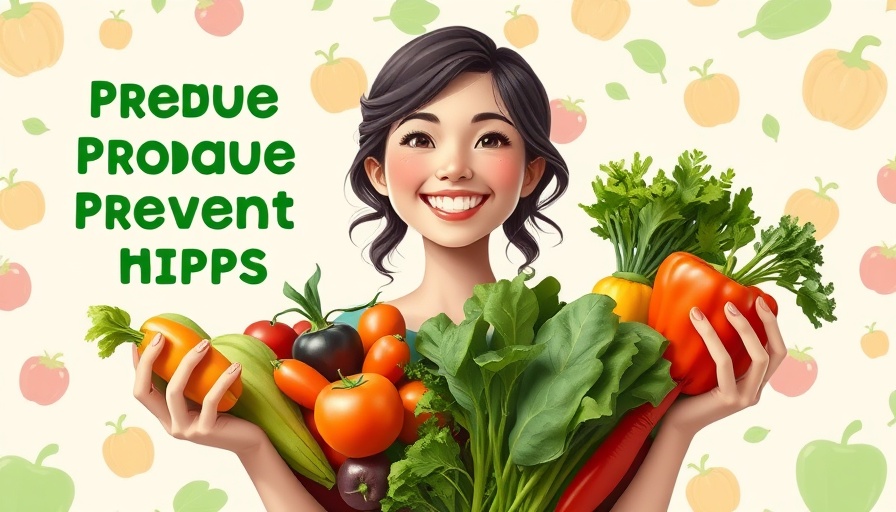
Understanding the Challenge of Food Waste
In today's world, food waste is an enormous yet often overlooked issue. Many of us have faced the frustrating experience of buying fresh produce only to watch it wilt and spoil soon after, leading to a hefty toss into the trash. This not only impacts our wallets but also has broader environmental implications. With over a third of all food produced globally going to waste, our kitchens contribute significantly to this epidemic. By learning how to store produce effectively, we can enjoy our fruits and vegetables longer and make a positive impact on our environment.
In the video, How to Make Your Produce Last Longer: Top 7 Food Storage Tips, the discussion dives into practical storage solutions for fresh produce, exploring key insights that sparked deeper analysis on our end.
Top Strategies to Extend Your Produce’s Freshness
Inspired by the insightful video, How to Make Your Produce Last Longer: Top 7 Food Storage Tips, let's explore seven practical ways to prolong the life of your fruits and vegetables.
1. Know What to Refrigerate
Not all produce thrives in the fridge; some prefer to bask at room temperature. Foods like berries, leafy greens, and carrots do best in cooler environments, specifically the refrigerator’s crisper drawer, where humidity is ideally controlled. In contrast, items such as bananas, avocados, and tomatoes flourish outside of cold storage, especially when kept in a dark, cool area. By understanding the specific needs of different produce, we can significantly enhance their shelf life.
2. Be Mindful of Packaging
The containers in which you store food can also impact longevity. Leafy greens often keep fresh longer when stored in perforated bags, while herbs can be revived and extended by placing their stems in water, much like a floral arrangement. For dry goods like nuts and seeds, glass jars are a stellar choice, offering protection from moisture and air. These simple adjustments can go a long way in maintaining your produce's integrity.
3. Prepping and Storing Smartly
Slicing and prepping your vegetables in advance not only saves time when cooking but also keeps them from spoiling quickly. Cut carrots and cucumbers can last longer when stored with a small amount of water at the base. Engaging in meal preparation can prevent wastage by ensuring you consume your produce before it spoils.
4. Understanding Ethylene Gas
Some fruits like apples and bananas release ethylene gas, which can accelerate the ripening process and spoilage of nearby produce. To combat this, keep ethylene-producing fruits away from delicate vegetables and greens. Alternatively, use this property to your advantage; placing avocados in a paper bag with a banana can speed up their ripening for when you're ready to enjoy them.
5. Eat in the Right Order
Knowing which produce to eat first can also help reduce waste. Fresh berries should be prioritized, followed by leafy greens, and then heartier options like apples and potatoes. Taking a few moments to plan your meals around what needs to be consumed first can make a significant impact on your grocery budget and enjoyment of fresh produce.
6. Reviving Wilted Greens
If you find your greens wilting, don't despair! An ice bath for about ten minutes can revitalize them, bringing back that crispness you love. Similarly, most vegetables can be frozen for later use, extending their shelf life and providing you with easy-to-use options for future meals.
7. Keep Your Refrigerator Organized
A clean and organized fridge can drastically reduce waste. Ensure that older items are placed at the front for easy access. Regularly check for expired items and maintain a quarterly fridge clean-out routine. Apps can be used to track groceries, helping avoid those “I thought we had that” moments.
The Broader Impact of Mindful Eating
By applying these simple tips, not only do we enhance the lifespan of our beloved fruits and vegetables, but we also embrace a healthier lifestyle and reduce our personal impact on food waste. As consumers, making informed choices about how we store and consume food fosters a more sustainable world.
By incorporating these strategies into your routine, you'll enjoy fresh produce longer and contribute positively to the environment. Start your journey towards mindful eating today!
 Add Row
Add Row  Add
Add 


Write A Comment